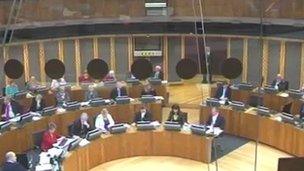Talks continue after Labour loses draft budget vote
- Published
The Welsh government has lost a vote on its spending plans for next year.
A tied vote in the Senedd meant a motion noting Labour's draft budget failed to pass.
While the result does not sink the entire budget, it increases pressure on First Minister Carwyn Jones.
Talks between the minority administration and opposition parties will continue in the run-up to a crucial vote on the final budget on 6 December.
Finance Minister Jane Hutt appealed to AMs to "work together in the interests of Wales".
Negotiations between Labour and the opposition stalled after the three opposition parties tabled a joint amendment last week. Their amendment also fell at Tuesday's vote.
The Conservatives, Plaid Cymru and the Liberal Democrats say they want big changes, with more money for the health service, schools and the economy.
All sides mustered as many members as possible for the vote, and Conservative AM Darren Millar, who broke his ankle during a recent visit to South Africa, arrived in a wheelchair.
The tussle to ratify a budget shows how difficult it will be for Labour to govern without a majority in Cardiff Bay.
Labour has 30 of the assembly's 60 seats and will need the support of at least one opposition member to get its budget through the Senedd.
Mrs Hutt said the draft budget she presented to the assembly built on the last budget drawn up by the former Labour-Plaid coalition, approved by the assembly in February.

Labour said the draft budget built on the plans it drew up with Plaid when they were in coalition
Changes from this year to next represented less than 1% of overall spending, she said.
"I hope we take this opportunity to show the people of Wales that we can collectively use our political skills, experience and wisdom and work together in the interests of Wales," she said.
She reached out to opponents, saying: "We don't have a monopoly of wisdom in government."
Despite her insistence that this was a budget for "jobs and growth", Plaid Cymru leader Ieuan Wyn Jones said the government had failed to respond to a dramatically worsened economy since Labour was re-elected in May.
Most governments want to hit the ground running, he said.
"I'm afraid that all this government has done is to hit the ground," he said.
"Let's face it - this government has done very little so far."
The Tories want more money for the NHS.
The assembly's cross-party health committee has said it is worried there will not be enough money available to help local health boards later in the year.
Funding for schools
Conservative finance spokesman Paul Davies said: "This vote sends a strong message of defiance to a first minister whose draft budget is not fit for purpose and whose refusal to provide flexibility has been naïve."
Welsh Lib Dem leader Kirsty Williams said her party's priority was to secure more funding for schools, particularly for disadvantaged pupils.
She said the Lib Dems could potential support a deal which shifts money around within the education budget if that meant more money for poorer pupils - but they would prefer an increase in overall spending on education.
She told reporters before the debate: "Obviously our priorities are Welsh Lib Dem priorities and we have been clear and consistent about what those are."
The Welsh government is facing unprecedented real-terms cuts to its Treasury block grant as a result of the public spending squeeze.
Its revenue budget will shrink by 2% next year. Capital spending - money for buildings and other infrastructure - will be cut by more than 10%.
After allowing for inflation, the health and social services department - the Welsh government's biggest spender - will take a £102m hit.
- Published15 November 2011
- Published11 November 2011
- Published10 November 2011
- Published9 November 2011
- Published5 October 2011
- Published4 October 2011
- Published4 October 2011
- Published4 October 2011